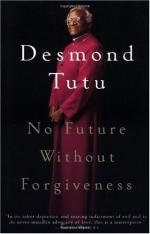
|
| Name: _________________________ | Period: ___________________ |
This test consists of 15 multiple choice questions and 5 short answer questions.
Multiple Choice Questions
1. What does Tutu say happened to black people injured on the side of the road when an ambulance for whites arrived in the story he recounted?
(a) They were killed.
(b) They were run over.
(c) They were ignored.
(d) They were helped.
2. What does Tutu think would have happened if the prime minister had not rescinded the ban of reform organizations?
(a) Nothing.
(b) A bloodbath.
(c) A victory for the white parties.
(d) A large turn out of voters.
3. Where did Tutu decide to vote for the first election open to black people?
(a) Cape Town.
(b) East London.
(c) Johannesburg.
(d) A ghetto township.
4. How many "severe violations" does the TRC categorize as "gross" violations of human rights?
(a) Four.
(b) Eight.
(c) One.
(d) Three.
5. When did the women become eligible for ordination in South Africa?
(a) 1992.
(b) 1991.
(c) 1999.
(d) 1995.
6. Who was the chief of the Inkatha Freedom Party in 1994?
(a) Robert de Verk.
(b) Nelson Mandela.
(c) Mangosuthu Buthelezi.
(d) Desmond Tutu.
7. What does Tutu say of the whites that came forward to the TRC?
(a) They were coerced.
(b) They were cowards.
(c) They were remarkable.
(d) They were scared.
8. How does Tutu explain why there was no bloodshed during the end of Apartheid?
(a) It was the right time.
(b) The army was deployed everywhere.
(c) The blacks had no weapons.
(d) The whites fled the country.
9. Where did the former segregationists live in 1994 according to Tutu?
(a) In South America.
(b) In Mozambique.
(c) Still in South Africa.
(d) In Europe.
10. What period did the Promotion of National Unity and Reconciliation Act apply to?
(a) 1965 to 1994.
(b) 1950 to 1994.
(c) 1960 to 1996.
(d) 1960 to 1994.
11. What did Tutu marvel at in "Chapter Five, Up and Running"?
(a) The strength of his will.
(b) The number of cases.
(c) The courage of the whites that came before the commission.
(d) The level of forgiveness of the victims.
12. How long did Mandela spend in prison?
(a) 15 years.
(b) 27 years.
(c) 5 years.
(d) 32 years.
13. What other approach, beside trials, does Tutu believe was not the right one either?
(a) Blanket amnesty.
(b) Ex-communication.
(c) Banishment.
(d) Death squads.
14. What did Tutu first suggest that TRC members do before abandoning the idea in face of protests?
(a) Appear before the TRC.
(b) Resign their party affiliations.
(c) Swear on the Bible.
(d) Pray.
15. Tutu states freedom would be exchanged for _____________.
(a) Truth.
(b) Money.
(c) Denouncing someone.
(d) A pound of flesh.
Short Answer Questions
1. Tutu stated the South African regime was _____________.
2. What does Tutu express about Mandela even when he was in prison?
3. What type of justice did South Africa use in the Promotion of National Unity and Reconciliation Act?
4. How many amnesty applications did the TRC have at the time of its first meeting, according to Tutu?
5. What did many people see the TRC doing?
|
This section contains 471 words (approx. 2 pages at 300 words per page) |

|




